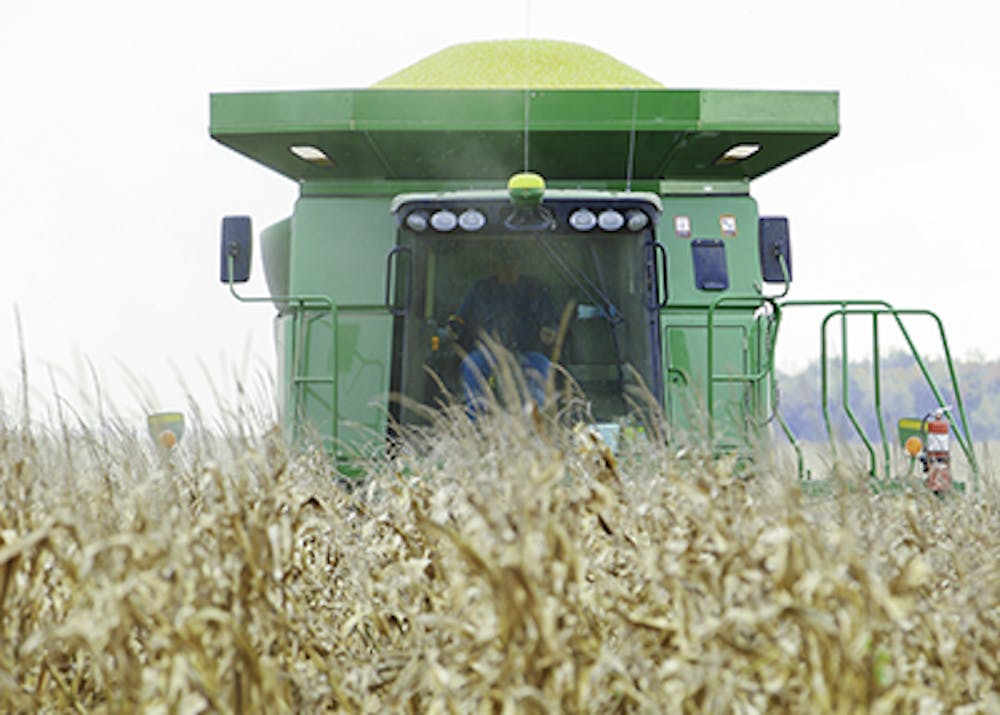Farmers, citizens to feel effects of this summer's drought
Steve Palmer and fellow Grant County farmers hoped for rain all summer.
August and September rains fulfilled those hopes. Perhaps they fulfilled them too much.
"We're feeling like it needs to quit raining," said Palmer, who is also a regional manager with Indiana Farm Bureau. "Even though we had a drought earlier this summer, it's been very wet as of late, and we can't get our soybeans harvested."
As harvest season hits, area farmers are dealing with the effects of fickle weather patterns, even as they, as well as farmers across Indiana and the Midwest deal with effects of this summer's drought.
That drought could have implications not only for farmers, but also for the average American doing their grocery shopping.
"We're gonna see food inflation probably next year in the range of probably three to four percent," said Chris Hurt, Agricultural Economist at Purdue University. "That has negative consequences, obviously, on families that are on tight budgets."
In the short run, livestock farmers will have to bear the burden of receiving less money for their product, according to Hurt.
A lack of grazing land during the spring and summer due to drought meant that farmers had to dip into their hay supplies to feed livestock. Some farmers decided to put their animals up for sale earlier than normal since they did not have the funds to feed them.
"It puts a lot of added pressure on you in terms of your feed costs," said Todd Hensley of Hensley Cattle Farms in Markleville, Ind. "It was a long, hard summer for everybody."
In addition, their problem this year has been caused partly by the lack of agricultural production, which has driven up feed costs for their animals.
While livestock farmers have been hurt by the drought, those raising crops have taken a hit, as well, especially those raising corn.
Because of a lack of rain during the early- to mid-July period when corn normally is in its reproductive stage in Indiana, the crop largely did not develop, and late rains did little to remedy that.
"I just realized and accepted the fact that we (weren't) going to have the corn yield that we had expected," said Jack Farley, who grows corn and soybeans on his Fairmount farm. "There's been years way back there that we've had this, and it's just part of farming that we go through."
Rains have been causing problems lately, albeit of a different sort, for soybean farmers.
Late rains helped soybean crops recover, as they can afford to receive rainfall later than corn. Now, farmers need the rain to stop so moisture levels in the plants dip below a certain level.
Once they cross that threshold, the beans can be picked and stored.
"With the soybean yields coming up, I'm sure it's helping a lot," Farley said. "I know there are some areas, even in our county, that are really suffering because of the hot, dry weather."
This summer's drought is most frequently compared to the 1988 dry spell, and it may end up being classified as the third or fourth worst of the past 100 years, according to Indiana Associate State Climatologist Ken Scheeringa.
Hurt said that the economic impact is estimated at $75 to $100 billion, behind only Hurricane Katrina and perhaps the '88 drought in terms of the economic impacts of natural disasters, according to the National Drought Mitigation Center.

"The impacts probably are not quite as great as they could have been because we're learning how to use our technology to manage the soil," Scheeringa said.
Farmers also receive protection through crop insurance that pays farmers when their crops fail. In fact, according to Hurt, some farmers will earn more than a normal year due to a combination of insurance and high prices for their product.
"There will be some farms that have higher incomes and say, 'What a wonderful thing to have, a drought gives me high income,'" Hurt said. "On the right insurance policies, that's going to provide some incomes for some that (are) very good, maybe above normal."
Farmers are also proposing a bill to Congress which would, in part, put measures in place to protect farmers in case of another drought. A group of Indiana Farm Bureau members went to Washington, D.C. recently to show support for that bill, according to infarmbureau.org.
Palmer said the bill has been passed by the Senate and is waiting for a vote in the House. Hurt believes it is likely to stay in that stage for a little longer.
"Largely what some feel has happened is that neither the Republicans or the Democrats really wanted to put this farm bill together and have criticisms of the farm bill coming from those swing states," Hurt said. "(They say) Let's just wait . . . , and then we'll move forward when it doesn't have the opportunity to influence the election."





